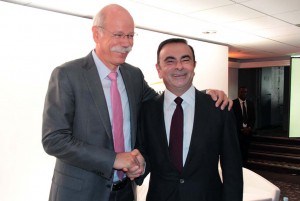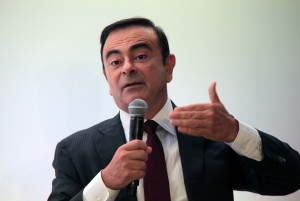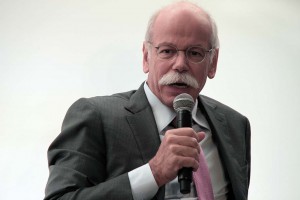
Everyone is all smiles after the latest installment of the "Carlos-and-Dieter Show" at the Paris Motor Show.
The 5-year-old alliance between Daimler AG and Renault-Nissan is set to double in size during the next six years, top officials predicted during a news conference at the Paris Motor Show.
The partners have already entered into a variety of joint ventures, including the development of several new microcars and the production of new gasoline and diesel engines. They will begin work on a new, shared assembly plant in Mexico next year, a facility that will eventually produce new compact luxury cars for both Daimler’s Mercedes-Benz brand and Nissan’s upscale marque Infiniti.
Appearing together for what has become an annual update they call the “Carlos-and-Dieter Show,” Daimler Chairman and CEO Dieter Zetsche and Renault-Nissan Alliance CEO Carlos Ghosn said they now have 12 different ventures going, up from the original three, and that is only likely to grow.
“We expect annual revenues to more than double over the next six years,” said Ghosn, who also noted that the original goal of saving about $2 billion in annual costs for each maker has already been substantially exceeded. Neither executive would provide hard numbers, however.

Renault-Nissan CEO Carlos Ghosn described the relationship between Daimler and Renault-Nissan as "corporate friends with benefits."
Among the newest developments, Daimler brought to the Paris Motor Show its new Smart Fortwo and Forfour microcars. They will be built off the same platform as the new Renault Twingo, the French maker leading the development effort. The two will pair on a commercial truck project, Nissan supplying its NV350 Urvan for sale by Daimler’s Mideast distribution network.
Starting next year, the Infiniti brand will begin producing a small model dubbed the Q30 that is based off a Mercedes-derived platform. Infiniti will also use the next-generation small car “architecture” for the vehicles it will produce at the new Aguascalientes plant in Mexico. Daimler will produce its own models on an adjacent assembly line.
(BMW drops top on new 2-Series convertible. For more, Click Here.)

Dieter Zetsche said that he expects the number of ventures between the companies to grow and they are they are exploring “an almost infinite source of ideas.”
When the unusual alliance was announced in 2009 there were plenty of skeptics, especially considering that Daimler had only just emerged from its disastrous “merger of equals” with Detroit-based Chrysler. Zetsche has told TheDetroitBureau.com that he learned a number of lessons that, in hindsight, appear to be helping the partnership with Euro-Asian Renault-Nissan thrive.
He and Ghosn insisted that no joint project will be launched unless both see it as a “win.” And they promised that they will maintain strong distinctions between products sold by Daimler and those produced by Renault-Nissan.
(Click Here for details on what’s going on at the Paris Motor Show.)
But Ghosn also stressed “There are many more projects to come,” Zetsche quickly adding that they are exploring “an almost infinite source of ideas.” If anything, Ghosn kicked in, “I am seeing more opportunities than I did two years ago, or four years ago. This is kind of a work in progress.”
During their Paris roadshow, Zetsche and Ghosn insisted that the alliance won’t be hurt by the recent exodus of some key Nissan executives – notably including Ghosn’s top lieutenant Andy Palmer, who left to become the CEO of Britain’s Aston Martin.
(To see more about Audi choosing a new TT from three concepts, Click Here.)
Asked if the partnership could survive their own departures, Ghosn admitted that might have been a problem early on, when it took the force of will of top management to get the alliance into gear. Today however, Zetsche said there’s enough momentum to keep things going even if one of the CEOs were to retire.
Nonetheless, the annual briefings have cemented the idea that the alliance is an almost personal project shared by the two men. Some news reports have, laughed Ghosn, given it an “almost romantic tone.”
To that extent, he said, “This is not a marriage (but) more like corporate friends with benefits.”
